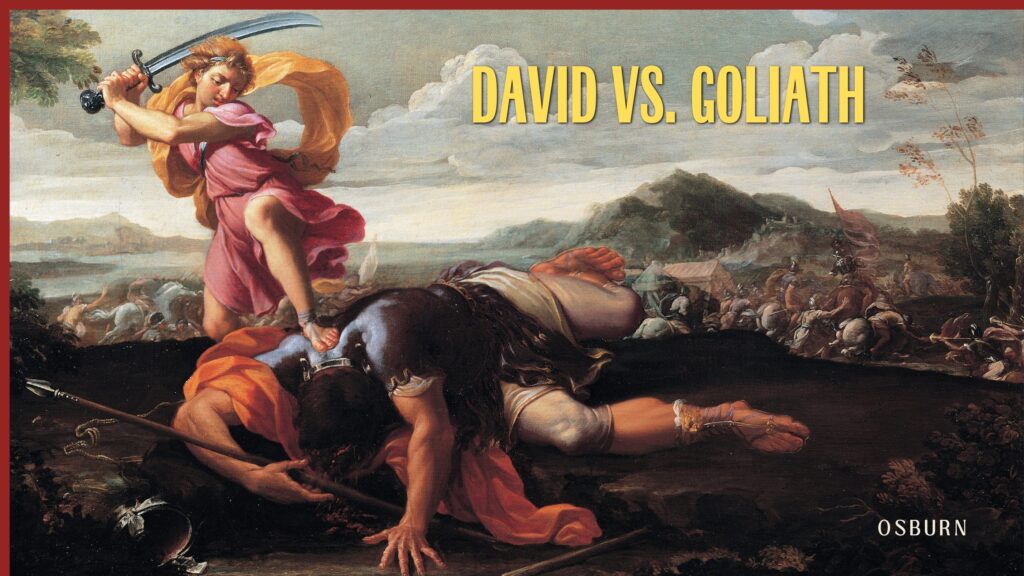3 Insights
“If you understand it, you don’t need to memorize it. If you don’t understand it, you don’t want to memorize it.” — Naval Ravikant
“There’s only one way and that is your way. There’s only one salvation and that is your salvation…What is to come will be created in you and from you. Hence look into yourself. Do not compare. Do not measure. No other way is like yours…You must fulfill the way that is in you.” ― Carl Jung
“When I am sharply judgmental of any other person, it’s because I sense or see reflected in them some aspect of myself that I don’t want to acknowledge.” ― Gabor Maté
What I Learned this Week
The concept of Gambler’s Ruin offers more than a mathematical exercise—it helps you understand the dynamics of “David vs. Goliath”type of battles. At its core, it illustrates the interplay of skill and size, and how these forces dictate the odds in life, business, and even personal challenges.
Picture this: David, a skilled opponent but with limited resources, faces Goliath, a less skilled but a rich opponent. Their battle unfolds over several rounds, with the loser of each round transferring resources to the winner. The game continues until one player is wiped out.

Green Canyon (Martin Sanchez)
David, with his 55% probability of winning a round, has a skill advantage. But Goliath’s initial resources—five times greater than David’s—offer a size advantage. The stakes? $1,000 per round. For David to win, he must triumph in 10 more rounds than Goliath. For Goliath, just two extra wins spell David’s ruin.
Who prevails? Despite David’s edge in skill, Goliath’s size advantage tips the scales. In this scenario, David’s chances of ultimate victory are just 36%, highlighting a stark truth—skill alone isn’t always enough to overcome overwhelming resources.
At its heart, the Gambler’s Ruin is a metaphor for resilience, strategy, and survival in an unfair world. To thrive against overwhelming odds, strategy must bridge the gap—whether it’s minimizing risks, finding games where everyone can win, or disrupting an opponent’s ability to leverage their full strength.
Low-cost experiments win wars. Reducing the stakes transforms the dynamics. At $100 per round instead of $1,000, David’s odds of victory soar from 36% to 98%. Probabilities determine outcomes over time, but randomness ensures there are no certainties. Click here to learn more about the concept
7 Mental Models
HANLON’S RAZOR: WHEN STUPIDITY WILL DO
Most people aren’t plotting your downfall; they’re just distracted, busy, or clueless. Life’s chaos tends to explain things better than any conspiracy theory. So next time someone cuts you off in traffic or forgets your name at a meeting, pause and think: Are they out to get me, or are they just human? The (obvious) answer might save you from plenty of unnecessary stress.
PARADOX OF ABUNDANCE: WHY TOO MUCH CAN LEAD TO LESS
What evolution shows us is that we’re wired to handle scarcity but not abundance. The more food we have, the less healthy we get. We now have access to access to (so much) information as never before—but are we getting wiser? There are very, very few millionaires or celebrities whose success was achieved without getting divorced, depressed, or miserable overall. Environments of abundance are great only for a few conscious individuals.
THE SPOTLIGHT EFFECT: NOBODY CARES AS MUCH AS YOU THINK
Imagine you’re wearing a brand-new outfit but then—you spill coffee on your shirt. You’re sure everyone at the office will notice, whisper about it, and secretly judge you. Spoiler: they won’t. The truth is, we’re all the stars of our own movies, far too absorbed in our own dramas to notice anyone else’s. Your embarrassing moments are just background noise to everyone else’s lives. You’re not under a spotlight; you’re standing in the crowd, like everyone else.
CONCEPT CREEP: HOW THE EXPANSION OF DEFINITIONS INFLATES ISSUES
Some social issues—think of abuse or trauma—are becoming rarer (this does not mean unimportant) in certain societies. But people tend to enlarge their definition, creating the illusion that such issues are getting worse. Consider the following three examples. A high school senior complains to her Facebook friends about a teacher and is suspended for “cyberbullying.” A 36-year-old man was initially convicted with rape in the Netherlands (instead of, maybe, sexual assault) after he French kissed a woman in a hospital restroom without her consent. What consequences does this phenomenon produce on a large-scale and in the long-term?
DUNNING-KRUGER EFFECT: THE CURSE OF IGNORANCE
Tools are cursed twice by Mother Nature: to understand the flaws of your cognition (thinking) you need proficiency in metacognition (thinking about thinking) which is a skill, by definition, fools lack. Mother Nature didn’t only make sure that some (many?) of us are stupid; but also that we are too stupid to realize how stupid we are. Fools thus possess an almost unlimited potential to ignore their ignorance.
References: Vizi Andrei & Nassim Taleb & Gurwinder Bhogal & David Perell & George MacGill
Reflections
What is something you want, but you haven’t had the courage to go get it? How much overlap is there between what you say is important to you and what you do?
Are the results you’re expecting aligned with the habits you’re following each day? Should you change your habits or expectations?
The Real Con 113
